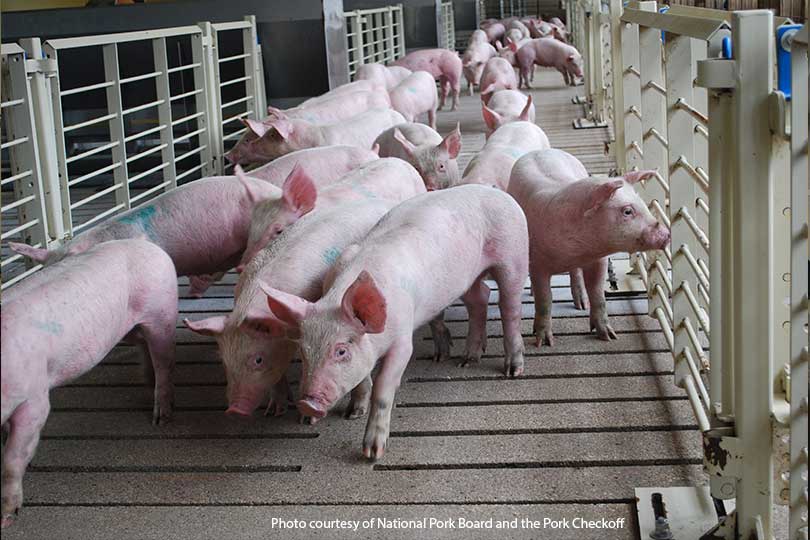By Jennifer Whitlock
Field Editor
In July, the U.S. Department of Agriculture (USDA) confirmed African swine fever (ASF) was found in samples collected from pigs in the Dominican Republic.
Just a hop from the Dominican Republic to Cuba, a skip from Cuba to Florida and ASF could jump into the U.S. pork supply chain—with no vaccine or cure in sight.
But USDA and the Department of Homeland Security are committed to working closely together to protect U.S. swine from ASF. And the Texas Animal Health Commission (TAHC) is committed to protecting the health and marketability of Texas swine, too.
“The significance of finding ASF in the Dominican Republic is important because the disease is now in the Western hemisphere,” Dr. Angela Lackie, TAHC assistant executive director, said. “To mitigate this finding, the USDA and Customs and Border Protection are increasing inspections of flights from the Dominican Republic, having the beagles at arrivals of ships and planes coming from that region to ensure that travelers do not bring any prohibited products to the United States.”
ASF is a highly contagious and fatal viral disease that affects both domestic and feral hogs. ASF was first identified in Africa in the early 1900s. Since then, the disease has been found in Europe, Asia and some Caribbean islands. To date, it has never been detected in the U.S.
While there are no specific details on the ASF case in the Dominican Republic, Lackie said it’s likely it came from feeding infected pork products from international flights or ships. As it only affects pigs and cannot be transmitted from swine to humans, ASF is not a human health or food safety concern.
“This is not a disease that can spread to humans by contact with swine or through eating pork. The devastation for people surrounds the potential lack of availability of pork for our consumption and how it would affect all commodity market,” she said. “Also, the financial devastation for pork producers is astronomical as there is no current swine vaccine available for ASF.”
Antibiotics are only effective against bacterial infections, not viruses like ASF. And since antiviral agents are not widely used in animals—especially food animals—she said containment and proper farm biosecurity is the only way to prevent ASF from spreading through pig populations once it has entered a continent.
In Texas, which ranks 13th in the nation for pork production, protecting the domestic herd is vitally important.
“We have a domestic herd of over 1 million swine here in Texas. Although pork production isn’t in the state’s top 10 agricultural commodities, the industry is important and significant. Our commercial industry is primarily concentrated in the Panhandle and is an important part of the High Plains regional swine industry, which includes Colorado, Kansas and Oklahoma,” Lackie said. “They’re all linked together, and they’re also linked with other concentrated pork production areas in the Midwest and the Southeast. Another important segment of the swine industry of Texas is the transitional swine industry that makes up show pigs, niche markets and supplemental income for families.”
Alongside federal agencies, TAHC has been preparing for ASF and other foreign animal diseases for years. But Lackie noted there is no way to know how quickly and how hard ASF would hit Texas, thanks to the estimated 5 million feral hogs ranging across nearly every county in the state.
Practicing basic biosecurity measures on farms is a start to preventing disease, however.
Since wild hogs are known to carry diseases not present in domestic populations, including brucellosis and pseudorabies, Lackie recommended double fencing or keeping domestic swine indoors to prevent exposure.
Not allowing human food to be brought on-site or to enter into areas where animals are kept is another good precaution. International food products carry an increased risk and should not be allowed on farms.
While feeding garbage or food waste to pigs is a common practice, she noted the activity is regulated by TAHC. Garbage fed to pigs should never include plate waste or meat of any kind.
General health and safety practices such as handwashing, preventing cross-contamination by wearing different clothing and shoes inside the animal facility and quarantining animals before introduction or reintroduction to the herd are other steps farmers should take to mitigate the risk of spreading disease.
“Lastly, wash, disinfect and allow equipment to dry before you bring it on-site. Some examples of that might be hog snares or any of the leads or sticks you’re using in the show ring,” Lackie said. “Those types of things can easily be washed and disinfected. Allow the sunshine to dry them and give some UV exposure. Because a lot of those tools that we call fomites are really easy ways that disease is introduced into other groups of animals.”
Click here for more information on ASF and to view TAHC’s animal health alert.

